Share

When Diplomacy Fails Podcast
Korean War #14: Race To Ruin
Episode 14: The Race To Ruin examines the Asian theatre in spring 1950, and the different concerns which the North Koreans, Soviet and Chinese leaders grappled with. At the apex of these concerns was the alternative plan of Mao's, as Mao desperately wanted to invade Taiwan, and end the Chinese Civil War once and for all before either American support or some form of republican resurgence on that island threatened China. This fear of the implications for Chinese security in Taiwan compelled Mao to act entirely as Stalin expected.
Mao was eager to invade Taiwan, but required Soviet aid to launch such an invasion since he lacked the necessary landing craft. Thus, Stalin held the cards, and he also held them in the Korean case, as supplies began arriving in Pyongyang at the same time as Stalin met with the North Korean delegation over February to April. Important details, and the blueprint of the war were essentially hammered out, and Stalin presented the conflict going the way which Kim had hoped. It would not be a long war, Stalin claimed, but a short sharp one, whereupon the fall of Seoul would cause a pro-Kim uprising in South Korea, and the country would fall without Kim Il-sung having to lift a finger. This, of course, was what Kim Il-sung wanted to hear.
If Kim was being duped by Stalin on this issue, then Mao wasn't doing much better. Gradually, at least, the Chinese leader was beginning to suspect that something was underway in North Korea. Because Stalin kept Mao in the dark on point of principle, Mao couldn't be sure of Soviet moves, but he felt a pressure upon his goals to invade Taiwan, and this was enough to force him to accelerate his plans for an invasion, with or without the necessary craft. This increased preparedness, of course, caused Stalin to increase his own Korean War plans. If Mao managed to seize Taiwan before the Korean War was launched, then Chiang Kai-shek would be absent, and the Sino-American relationship could be potentially healed. To prevent this, Stalin attempted to intercept the Chinese by pushing Kim forward in Korea. It was thus a race, yet on any consideration, it was a race to ruin. Stalin was eager to launch the war, but he was far from eager to actually fight it.
*********
1956 - The Eventful Year is now LIVE! Head on over to its new home and check out this new, originally researched series, and listen to over two hours of free content now! If you like what you hear, why not join up on Patreon for $5 a month, and get access to the complete story 1956 provides: a rich and immensely detailed saga spanning 35 episodes!? You'll be investing in WDF's future, feasting on all the best exclusive content to come, AND have access to the XTRA feed's extensive back catalogue! Thanksss!
For 1956: https://www.acast.com/1956eventfulyear
To access it all, head over to the XTRA feed: https://www.patreon.com/WhenDiplomacyFails/posts
Want to grab yourself some quality, stylish head/ear phones and get 15% off? Use the code WDF to avail of this special offer and start your listening journey with When Diplomacy Fails like never before! See: https://www.sudio.com/eu/
Want to support this podcast in other ways, as we meander through the Korean War? Check out the following links to our social media, website, source materials and Patreon below.
Facebook page: https://www.facebook.com/WhenDiplomacyFailsPodcast/
Facebook group: https://www.facebook.com/groups/1856652614380207
Twitter: https://twitter.com/?lang=en
Support us financially on Patreon and access an ad-free episodes ($2 per month) and an hour of extra content ($5 per month):
More episodes
View all episodes
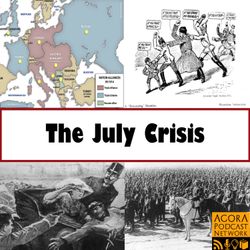
#56: 2 August 1914 IV - Let Loose World Madness
54:39|Even as Moltke examined Germany's strategic options, the world was turning against Germany. Berlin pressed its case by pointing out the Russian sins of dishonesty and pre-emption, but was anyone listening? Britain's diplomats in Berlin, St Petersburg, and Vienna had had enough. The news from Luxemburg was a clear sign of things to come, and even if they were sympathetic to the Kaiser's position, the German response was viewed as an overreaction. Declarations of war came from Berlin and Vienna, not Paris and St Petersburg, and this was bound to drown out any pleas about technicalities.To make up for this, German officials began reporting with increasing frequency on rumours and conjecture, dressing up impossible stories about outrages and violations as proof of Russian and French responsibility. But this only made their hole deeper, and even as Berlin cried foul, it was actively moving the ball forward, into Belgium. The imperatives of the Schlieffen Plan meant the ruin of Germany's reputation, and forced German officials to cling to the delusion that the eventual triumph would all be worth it - even while they opened Pandora's Box, and unleashed the madness of a great war upon the world.Support the July Crisis series, join the conversation, and find out more through these links:Do you want ad-free episodes with scripts attached, and bonus content? Support us on Patreon and you can suggest July Crisis episodes!Join our Facebook group as we make our way through this fascinating series!Click here to see our July Crisis workspace in Perlego, you'll find every source you need!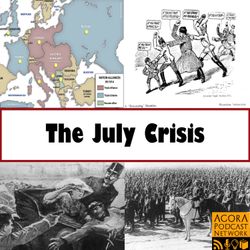
#55: 2 August 1914 III - Lichnowsky's Last Stand
46:25|While Germany covered itself in infamy, the German ambassador in London did his best to maintain the fragile Anglo-German relationship. His mission was ultimately doomed, but no one could accuse Prince Max Lichnowsky of failing to try. An avid Anglophile and advocate of closer ties between the two countries, Lichnowsky continued to hope that his masters in Berlin could be persuaded that it was worth making a sacrifice in the war effort, if it meant Britain stayed out of the war. Unfortunately for him, Berlin did not agree, and had effectively written Lichnowsky off as having gone native. Lichnowsky would not spare his masters from criticism, and would insist until the end of his life that Germany had been the agent of its own misfortunate, while he was just one of many casualties.Support the July Crisis series, join the conversation, and find out more through these links:Do you want ad-free episodes with scripts attached, and bonus content? Support us on Patreon and you can suggest July Crisis episodes!Join our Facebook group as we make our way through this fascinating series!Click here to see our July Crisis workspace in Perlego, you'll find every source you need!
The State of America w/ Thom Daly - Part 2
01:46:10|In this second part of my conversation with Thom, we discuss the unlawful way in which the Trump administration behaves at home, including its treatment of citizens who hold views which the President does not like. It is free speech for me, but not for thee, and we look at the historical context for these actions. Can anything stop Trump? Or are the courts as toothless as Congress and the press. Will the American people be forced to fix these things themselves, or is it already too late to return to the America we used to know? Thanksss again to Thom for joining me, and I hope you enjoyed this deep dive into modern America.
The State of America w/ Thom Daly - Part 1
01:20:11|In this first of two episodes with Thom Daly, we focus on the United States and its position in the world following the Trump administration's many blunders and betrayals in foreign policy, trade policy, and many more things besides. If you believe what Trump has done is antithetical to America and what it is supposed to represent, then you'll be in good company. Please join us for a passionate conversation, and let me know what you think.
#54: 2 August 1914 II - Britain Decides On War
47:42|The traditional picture of British intervention in the First World War normally comes down to one issue - Belgium. On 4 August, Britain did declare war on Germany. However, before this monumental step took place, Britain had already made its choice - or, rather, the British Cabinet had. The Liberal government was against intervention in a majority, and we have seen countless manifestations of this position over the previous days. Asquith, Grey, and Churchill wanted to intervene, but how could they persuade their colleagues of this? In this episode, we discover that the reasons for the government's conversion to intervention came not from Belgium, or France, or even Luxemburg, but from internal political factors.Simply put, when Grey, Asquith, Churchill and others signalled that they would resign if neutrality became policy, and when the Conservative opposition signalled that they would march to war if in power, the remaining Cabinet members faced an impossible choice. Either they could swallow their opposition, and concede to what Grey and the interventionists wanted, or they could resist, the government would collapse, and the Tories would take Britain to war regardless. As we will see in this episode, this was not much of a choice at all...Support the July Crisis series, join the conversation, and find out more through these links:Do you want ad-free episodes with scripts attached, and bonus content? Support us on Patreon and you can suggest July Crisis episodes!Join our Facebook group as we make our way through this fascinating series!Click here to see our July Crisis workspace in Perlego, you'll find every source you need!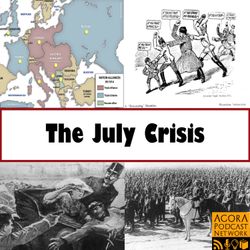
#53: 2 August 1914 I - Into Luxemburg
40:31|The Schleiffen Plan demanded an invasion of the small Grand Duchy of Luxemburg, where German forces would seize key railway installations, facilitating their march into Belgium, and then to France. Of course, nobody told the Luxemburgers, but Berlin was very eager to make it clear that this unannounced invasion was not an invasion at all. Oh no, this was merely a precautionary measure, essential for German security. If the Luxemburgers complied peacefully, all would be well. If not, well, then the Luxemburgers must be mad to face down the full might of 7/8 of the German army which barrelled towards them. As hundreds of thousands of soldiers flooded westwards, Europe was alight with diplomatic activity, complete with questions which really should have been answered by now. Peace was all but lost, but that did not mean the war had to arrive with any measure of clarity.Support the July Crisis series, join the conversation, and find out more through these links:Do you want ad-free episodes with scripts attached, and bonus content? Support us on Patreon and you can suggest July Crisis episodes!Join our Facebook group as we make our way through this fascinating series!Click here to see our July Crisis workspace in Perlego, you'll find every source you need!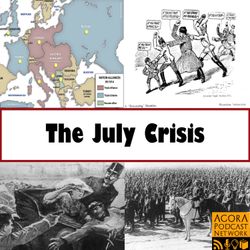
#52: 1 August 1914 IV - Desperate Diplomacy
42:37|Now that it was clear Germany would have to face the Entente, and likely Britain's imminent intervention, Berlin became much more active in sending diplomatic feelers across Europe. Romania, Bulgaria, Italy, and the Ottoman Empire, were all ideal targets. Some were erstwhile allies, others convenient partners, but could they be relied upon now, when the war had become reality?In St Petersburg, the Russian answer to Germany's ultimatum was finally delivered, even if it took several hours for it to reach Berlin. However Sazonov might try to dress it up - however much editorialising the final meeting between he and the German ambassador endured - one thing could not be denied. Russia and Germany were now at war, and both conceived of this conflict as purely defensive in nature. Each had a point, but neither were able to pull back, and talk increasingly turned from preserving peace to preparing for war, as the desperate diplomacy of all sides did its work.Support the July Crisis series, join the conversation, and find out more through these links:Do you want ad-free episodes with scripts attached, and bonus content? Support us on Patreon and you can suggest July Crisis episodes!Join our Facebook group as we make our way through this fascinating series!Click here to see our July Crisis workspace in Perlego, you'll find every source you need!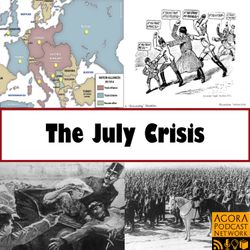
#51: 1 August 1914 III - The Kaiser's Rollercoaster
42:21|We open with the shattered dreams of Kaiser Wilhelm II, as the British claim a 'misunderstanding' must have occurred to make Berlin believe Britain and France could remain neutral. The rollercoaster of emotions ended with Wilhelm's bitter confirmation to Moltke - he could do what he liked now. What Moltke liked to do and what he had to do were one and the same. It was time to switch back on the Schlieffen Plan, which meant world war was inevitable. And yet, Germany delayed its declaration of war on France, even as mobilisation was announced in Paris, and Italy signalled it would remain neutral. Germany's diplomatic options had shrank dramatically. All that now existed was Vienna, and the hope that the pressure campaigns in Constantinople would finally pay off, yet there were no guarantees. The only guarantee was that war was now official, even if St Petersburg had yet to confirm it...Support the July Crisis series, join the conversation, and find out more through these links:Do you want ad-free episodes with scripts attached, and bonus content? Support us on Patreon and you can suggest July Crisis episodes!Join our Facebook group as we make our way through this fascinating series!Click here to see our July Crisis workspace in Perlego, you'll find every source you need!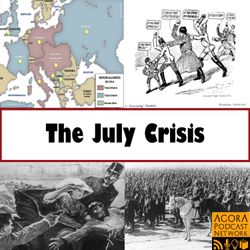
#50: 1 August 1914 II - 'There Must Be Some Misunderstanding'
52:57|In the final hours of peace, the German government was led to believe that a miracle had occurred. Incredibly, Britain had affirmed its intention not only to remain neutral, but to guarantee the neutrality of France as well. Where had such a monumental offer come from? Was it legitimate, or the product of a 'misunderstanding' between the German ambassador and the British government? In this episode, we examine this infamous chapter in the crisis historiography. Had the British Foreign Secretary's vagueness caught up with him, or was Lichnowsky, the German ambassador, to blame? Had they got their wires crossed, or was something more fascinating going on under the surface, in a city where petitioners bombarded London with requests for support, and more information? Let's find out, as we try to understand this misunderstanding.Support the July Crisis series, join the conversation, and find out more through these links:Do you want ad-free episodes with scripts attached, and bonus content? Support us on Patreon and you can suggest July Crisis episodes!Join our Facebook group as we make our way through this fascinating series!Click here to see our July Crisis workspace in Perlego, you'll find every source you need!